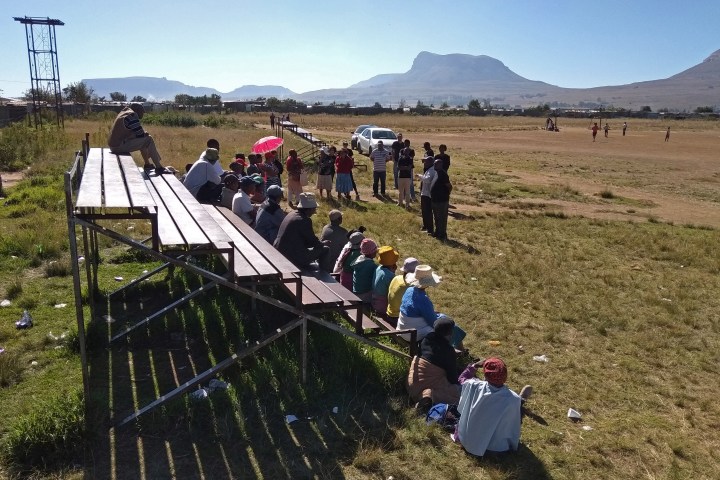NEW FRAME
The Scars of Labour: A Bitter Harvest in Harrismith

Harrismith workers’ assembly highlighted a countryside in deep crisis. Many at the meeting criticised what they believed to be collusions between the state against workers.
Bafana Philemon Khutha started his working life as a worker on the farms of the eastern Free State and northern KwaZulu-Natal. He is now a union organiser.
Khuta was one of the numerous workers, organisers and activists who gathered over the weekend in Intabazwe Township in Harrismith for a two-day Bambanani Paralegal and Advocacy Centre (BPAC) workers’ assembly. The story that he tells about how he came into the union movement includes being forced to dig his own grave at gunpoint after leading an unprotected strike.
Many at the assembly criticised what they believed to be collusions between the state and capital against workers. The bitter critiques took on a spectral quality. The township, now in an autumnal blush, was home to Teboho Mkhonza, a 17-year-old school pupil who was gunned down by police in late 2004 in one of the large protests that swept the country that year.
The workers’ assembly focused on the brutal treatment of farm workers throughout the region and considered options for worker-led resistance. Advances in technology and climate change have resulted in year-long seasons, which has made the insecurities of seasonal work more persistent. Agricultural labour is increasingly being done by women, and workers are now more likely to be employed by labour brokers rather than farmers.
The scars of labour externalisation and casualisation run deep in Intabazwe. Growing shack settlements – the results of mass evictions from neighbouring farms and the increasing demand for seasonal work – now embrace the township.
Thoko Selepe, 40, lives in one of these shack settlements. She reports that she previously lived on nearby Bagshot Farm. Thoko says that in 2008 the farmer and two neighbouring farmers kicked down her family’s front door. She and her four children managed to escape out of a window, but her husband, Oupa Daniel Selepe, did not. Speaking from palpable pain, she says that the three farmers beat him until he was close to death. She explains that she managed to flag down a neighbour and take her husband to a hospital in town where he died as a result of his head injuries.
Now living in Intabazwe, Thoko supports her children, two grandchildren, an uncle and a cousin on the money she earns from three day’s domestic work per week in Harrismith. There are many others who have come into Intabazwe from the farms. BPAC co-ordinator Vuka Tshabalala says that “not a month passes without a truck dropping off the evicted people and their belongings in open space (in Intabazwe)”.
Jeffery Mlotshwa reports that his life in Intabazwe began when he was offloaded in the township, together with his wife and their belongings, by such a truck in 2004. Now 59-years-old, Mlotshwa spent the preceding 40 years mending fences and tending cattle on the Toronto farm, near Harrismith. He says that after he fell ill, the farmer dismissed and evicted him for “no longer being able to work”. He recalls that at the time of his eviction he was earning R100 per month.
David Lephoto’s mother lived her entire life on Sunrise Farm. She was born on the farm in 1918 and died there, 90 years later, in 2008. David was born at Sunrise in 1960. He says that the farmer refused to allow him to bury his mother on the farm.
He managed to force the farmer’s hand regarding the burial after approaching the Free State provincial government. But, he says, soon after he had laid his mother to rest unexplained deductions from his wages were instituted. New Frame has seen documents confirming that Lephoto’s monthly wages of R1,400 fell to R736.73.
He recalls, with a precision clearly born in pain, that his water was also cut off, as was the land made available to him to graze his 30 cattle, 19 sheep, 25 goats and three horses. It did not take long before Lephoto was forced to leave Sunrise.
He reports that half of his livestock had perished when he returned five years later to collect them. None of his horses remained, and only four of his sheep. The remaining animals now eke their grazing out around Lephoto’s new home in Intabazwe.
Neither Mlotshwa nor Lephoto have found work since being forced off Toronto and Sunrise.
Nokusa Selepe says that struggles also persist for people who remain on farms. Her father started working at Sandhurst Farm in 1976. She says that after her father died in 1998, the farmer forced Selepe’s eldest brother to abandon his high school education in order to take up his father’s work.
Selepe cannot remember the year when the farm was sold to the South African National Roads Agency Limited (Sanral), but she does recall that the farmer cut off water and electricity to the four households of farm workers on the farm before the sale.
The farm now lies fallow. With Sanral not putting the land to any productive use, the 30 remaining inhabitants are selling off their livestock to survive.
Selepe says that they are unable to get construction jobs which are administered by corrupt Harrismith ward councillors who have little time for the concerns of farm dwellers.
Tshabalala says that the municipality, which is heavily invested in the local agricultural economy, has obstructed BPAC’s efforts to assist farm workers in the region by withholding permission to use municipally owned halls and spaces for meetings. He adds that local ANC politicians now own a number of farms around Harrismith.
If this assembly was a window into a reality usually outside of metropolitan concerns, the countryside is in profound crisis. DM
















 Become an Insider
Become an Insider